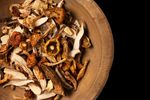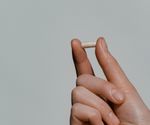THE WELL's Chief Medical Officer explains how these all-natural anti-stress and fatigue fighters work, plus four of his favorites.
When people feel tired or stressed, they often reach for a quick fix — namely, caffeine or sugar (or both). But these cheap sources of fuel don’t actually work to combat stress, fatigue and other negative side effects of our busy lives. You may experience a brief energy boost, but the crash is never far behind. Then it’s back to coffee or cupcakes to start the vicious cycle again, resulting in a rollercoaster ride of highs and lows.
Fortunately, there are healthier ways to get through the day. One of my favorites is with adaptogens, special herbs that help your body adapt to stressors.
RELATED: How to Cut Back on the Big Three — Sugar, Caffeine and Alcohol
What are adaptogens?
This unique class of herbal ingredients can be used to improve the health of your adrenal system, which is in charge of managing your hormonal response to stress. They enhance your body's ability to cope — without jolts or crashes. They’re called adaptogens because of their startling ability to adapt their function to suit your body’s specific needs. Though the effects may initially be subtle and take time to be felt, they’re real and undeniable.
Unlike many pharmaceutical drugs, adaptogens weren’t born yesterday. In fact, they’ve been used in Chinese and Indian Ayurvedic medicine for centuries to boost resilience in the face of stress. Recently, several studies have found evidence to support what those of us in the sustainable wellness field already knew: that adaptogens offer positive benefits — and are generally safe for long-term use.
"Though the effects may initially be subtle and take time to be felt, they’re real and undeniable."
How do adaptogens work?
Adaptogens operate a bit like a thermostat. When the thermostat senses that the room temperature is too high, it brings it down; when the temperature is too low, it brings it up. Adaptogens can calm you and elevate your energy at the same time without overstimulating your system. In that sense, they can normalize body imbalances. They also enable cells to eliminate toxic byproducts of the metabolic process and help the body to utilize oxygen more efficiently.
Which to Use
I prefer formulations that combine adaptogenic herbs, and the one I consider the most important are Asian ginseng, eleuthero, ashwaghanda and rhodiola rosea. Depending on your needs and physical condition, you can take these adaptogens individually or, as I said, in combination.
When buying a formula, look for one that has at least three of the aforementioned adaptogens, make sure it has rhodiola in it. (Sun Potion is a reputable brand recommended by health coaches at THE WELL.) Always consult your doctor to get the all-clear before starting an herbal protocol.
1. Asian Ginseng
Historically, Asian Ginseng has been one of the most valued (and expensive) medicinal plants in the world. Herbalists say that it restores and strengthens the body’s immune response, promotes longevity and enhances the growth of normal cells. Research also indicates that it promotes a sense of well-being and may protect against some kinds of cancer.
Recommended Dose:
100 to 200mg per day of a standardized extract
Caution: At the recommended dose, ginseng is generally safe. Occasionally it may cause agitation, heart palpitations or insomnia. Consuming large amounts of caffeine with large amounts of ginseng may increase the risk of overstimulation and gastrointestinal upset. If you have high blood pressure, your blood pressure should be monitored when taking it. Ginseng is not recommended for pregnant or breastfeeding women.
2. Ashwagandha
Ashwagandha has been used for thousands of years in Ayurvedic medicine. Like Asian ginseng, ashwagandha is used to help increase vitality, energy, endurance and stamina, promote longevity and strengthen the immune system.
Today, herbalists often recommend it for people with high blood pressure, insomnia, chronic fatigue syndrome and impotence associated with anxiety or exhaustion. It enhances endocrine function via the thyroid and adrenals. Ayurvedic healers have long prescribed the herb to treat exhaustion brought on by both physical and mental strain.
Recommended Dose:
3 to 6 grams per day of the dried root
Caution: Avoid during pregnancy, if you are taking sedatives or if you have severe gastric irritation or ulcers. Also, people who are sensitive to the nightshade group of plants (such as tomatoes, peppers and eggplants) should be careful because this herb can have a similar inflammatory impact.
3. Eleuthero
Eleuthero is used in Traditional Chinese Medicine (TCM) for muscle spasms, joint pain, insomnia and fatigue. In Germany, its use is approved for chronic fatigue, impaired concentration and recovering after illness. Western herbalists note that it improves memory, feelings of well-being and may be able to help lift mild depression.
Recommended Dose:
2 to 3 grams per day of the dried root
Caution: As with Asian ginseng, eleuthero is generally safe, but has occasionally been associated with agitation, heart palpitations or insomnia in patients with cardiovascular disorders. If you have high blood pressure, your blood pressure should be monitored when taking it. I don’t recommend it for pregnant or breastfeeding women.
4. Rhodiola Rosea
Rhodiola rosea acts like a hormone regulator, especially as it pertains to cortisol, one of our main stress hormones. I believe that cortisol, which is secreted in sync with your circadian rhythms, is usually — if not always — out of whack when you’re stressed out. This means your cortisol level is either too high when it should be low or not high enough when you need more.
Getting your cortisol fluctuations back in rhythm when you’re compromised is crucial, and rhodiola helps balance cortisol levels in your body, raising or lowering it as needed. What’s more, rhodiola has demonstrated a remarkable ability to support cellular energy metabolism. It is thought to positively affect brain function, depression and heart health. In my experience, most patients who take rhodiola start feeling better within a few weeks to a month.
Recommended Dose:
200 to 600mg per day of a rhodiola rosea extract standardized to contain 2 to 3 percent rosavins and 0.8 to 1 percent salidroside. Or 2-3 grams per day of the nonstandardized root.
Caution: Avoid if you have manic depression or are bipolar. Rhodiola is not recommended for pregnant or breastfeeding women. Although it’s unusual, it can cause insomnia when taken in high doses.




